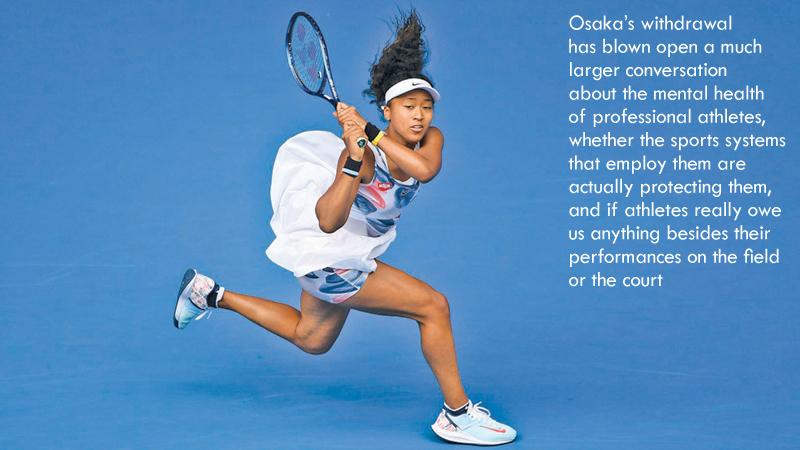
The writer explains why Naomi Osaka's withdrawal from the French Open reveals a much larger issue around mental health and sports.
Naomi Osaka announced via social media on May 31 that she would be withdrawing from this year’s French Open. Her withdrawal comes one day after being fined $15,000 for her choice to not engage with the media during the tournament and also being threatened with expulsion from the tournament and future grand slam suspensions.
After Osaka’s win over Patricia Tig in her first-round match of the tournament on Sunday, and her subsequent absence from the post-match press conference, a joint statement was issued by all four Grand Slams — the Australian Open, Roland-Garros, Wimbledon, and the US Open — warning the athlete of “tougher sanctions” should she continue to violate the rulebook.
Osaka’s decision to withhold from the press was a choice to protect her mental health, something that she has publicly spoken about struggling with in the past.
“This isn’t a situation I ever imagined or intended when I posted a few days ago,” wrote Osaka in her withdrawal statement, referring to her initial announcement. “I think now the best thing for the tournament, the other players, and my well-being is that I withdraw so that everyone can get back to focusing on the tennis going on in Paris.”
Osaka went on to explain that she “never wanted to be a distraction.” She reveals that she’s been suffering “long bouts of depression” since the tumultuous 2018 US Open, when she won against Serena Williams, and has been struggling to cope. Osaka continued, expressing that her social anxiety also amplified her feelings of vulnerability leading up to the French Open. “I am not a natural public speaker and get huge waves of anxiety before I speak to the world’s media,” Osaka said. “I get really nervous and find it stressful to always try to engage and give you the best answers I can.” In her closing words, Osaka stated that she would not only be withdrawing from this year’s French Open, but also be taking time away from the court.
Osaka’s justification of her reasoning to not speak with the press is disheartening for many reasons, but primarily this: the preservation of one’s mental health is a serious matter that should be respected as a priority.
Many have offered their support to Osaka, including fellow athletes like Steph Curry, Coco Gauff, and Serena Williams.
“I feel for Naomi,” Williams said to the press after her own first-round match at Roland-Garros. “I feel like I wish I could give her a hug, because I know what it's like… Everyone is different, and everyone handles things differently. You just have to let her handle it the way she wants to and the best way that she thinks she can, and that's the only thing I can say, I think she's doing the best that she can."
Osaka’s withdrawal has blown open a much larger conversation about the mental health of professional athletes, whether the sports systems that employ them are actually protecting them, and if athletes really owe us anything besides their performances on the field or the court.
Osaka’s ultimate decision to withdraw is a reclaiming of agency. After battling it out on the clay and exerting the power of her body to unrivaled degrees, the post-match press conference, according to Osaka, requires her to exert herself in even more ways, placing a strain on all parts of her being. Fines and threats of expulsion are the ways in which the tennis system has tried to ensure that Osaka “fulfills” these obligations. However, Osaka chose to protect her mental health over it all — she was not only ready to pay the fine, but she also proved ready to walk away from the court entirely.
The culture of mental health in sports has been shifting as athletes like Osaka and Kyrie Irving are more transparent about their experiences in the media, but there is clearly more change to be made. Osaka, Irving, and Serena Williams have all spoken out about the scrutinization and mistreatment they face in sports, which is often exacerbated by race, and yet, the trend of disrespect towards athletes’ mental health — and particularly Black athletes’ mental health — continues.
In a now deleted tweet, the French Open posted a photoset of four tennis players attending media conferences, with the caption: “They understood the assignment.” If the No. 2 ranked tennis player in the world would rather not play than endure a post-match conference that directly harms her well-being, it is clear that the system she works in needs to be re-evaluated.
"On behalf of the Grand Slams, we wish to offer Naomi Osaka our support and assistance in any way possible as she takes time away from the court. She is an exceptional athlete and we look forward to her return as soon as she deems appropriate," said the Grand Slams in another joint statement following Osaka’s withdrawal. "Mental health is a very challenging issue, which deserves our utmost attention. It is both complex and personal, as what affects one individual does not necessarily affect another.
“We commend Naomi for sharing in her own words the pressures and anxieties she is feeling and we empathize with the unique pressures tennis players may face."

